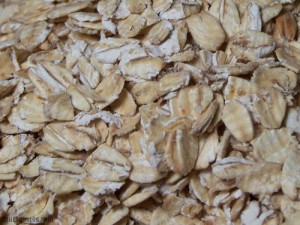 Oats are far more versatile than to simply be used for porridge or gruel. Whole Oats (usually Whole Rolled Oats) are a great source of protein, fiber, vitamins, and minerals. Whole oats have been proven to help reduce cholesterol levels and make a great healthy breakfast that will keep you contented all the way until lunch.
Oats are far more versatile than to simply be used for porridge or gruel. Whole Oats (usually Whole Rolled Oats) are a great source of protein, fiber, vitamins, and minerals. Whole oats have been proven to help reduce cholesterol levels and make a great healthy breakfast that will keep you contented all the way until lunch.
Oats are very seldom sold with the hull left on for eating. The whole oat grain is usually called “oat groats”, which is the least-processed form which can be used in the same ways you would use wheat kernels. Oat groats can be milled into flour or flaked into what we are used to as Old Fashioned Rolled Oats.
Steel Cut Oats are whole oat groats which have merely been roughly cut. Old-fashioned have been flattened and quick-cooking oats have been steamed a bit, cut and flattened to speed cooking process. Instant oatmeal has been rolled very thin and is already partially cooked. For nutrition (and some people would say for full texture), a thick rolled oat is the most full bodied option for a substantial oatmeal.
Because of their somewhat higher fat content, oats should be stored away from any heat or damp in an airtight container. The suggested storage time for oats is about three to six months.
In addition to porridge, oats can be used for stuffing, added to baked goods, or cooked whole and added to grain salads. Try using them in place of bread crumbs for meatloaf. Top a cobbler with a mixture of whole wheat flour, butter, sugar and whole oats. It’s also easy to make your own Granola!


